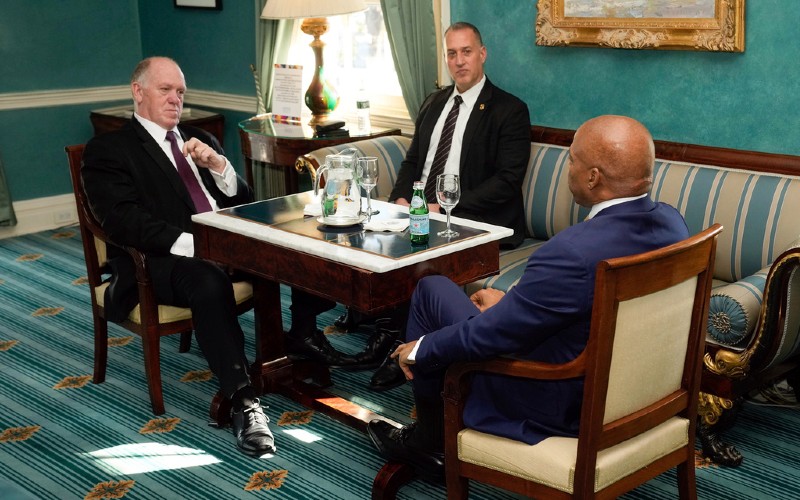Instead, diplomatic efforts are in high gear as key U.S. leaders have visited Israel in recent days.
They’ve met with Prime Minister Benjamin Netanyahu, their Israeli counterparts, and discussed Hamas, which did release three more Israeli hostages over the weekend. Another key point of talks has been Iran.
“Israel and America stand shoulder-to-shoulder in countering the threat of Iran. We agreed that the ayatollahs must not have nuclear weapons, and we also agreed that Iran's aggression in the region has to be rolled back,” Netanyahu said Sunday following his meeting with U.S. Secretary of State Marco Rubio.
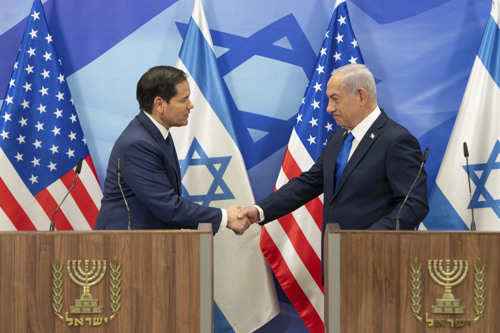 Netanyahu met with a bipartisan group of visiting U.S. Senators including Lindsey Graham on Monday.
Netanyahu met with a bipartisan group of visiting U.S. Senators including Lindsey Graham on Monday.
The prime minister’s comments came with the strength and clarity of a renewed level of U.S. commitment under to Trump administration to Israel’s fight against Hamas, which murdered more than 1,200 of its citizens and raped and kidnapped many more on Oct. 7, 2023.
Hamas on Saturday released hostages Alexander Troufanov, 29, Sagui Dekel-Chen, 36, and Yair Horn, 46.
For its part, Israel released more than 300 Palestinian prisoners from its jails.
It was part of a previously scheduled release, the sixth exchange under the ceasefire which began on Jan. 19.
Hell hasn’t been loosened yet
Hamas had previously said it would not release more hostages, saying Israel had violated the ceasefire agreement by not allowing enough aid into Gaza.
That prompted Trump to demand that Hamas release all remaining hostages by noon last Saturday, Feb. 15, or he would propose canceling the ceasefire and “let all Hell break loose.”
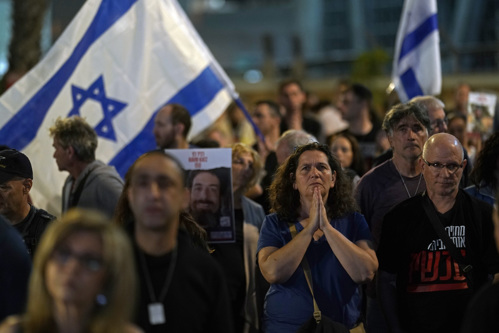 “It’s really a gut-wrenching time for Israel, jubilation about the reunion of the family members, but dozens and dozens of hostages are yet to be resolved,” Chris Mitchell, the Middle East bureau chief for the Christian Broadcasting Network (CBN), said on Washington Watch Monday.
“It’s really a gut-wrenching time for Israel, jubilation about the reunion of the family members, but dozens and dozens of hostages are yet to be resolved,” Chris Mitchell, the Middle East bureau chief for the Christian Broadcasting Network (CBN), said on Washington Watch Monday.
Phase 1 of the ceasefire expires early next month. Mitchell told show host Tony Perkins that negotiations are under way for Phase 2.
Fox News estimates that 70 hostages remain held by Hamas.
The current situation with Hamas has been a big part of talks between Netanyahu and the U.S. leaders, but the best approach to deal with Iran, the financier of Hamas, has been equally discussed, Mitchell said.
Relating to Hamas, Netanyahu, now with Trump’s backing, has remained clear in his intention to fully remove Hamas from power.

He says he and Trump are working in “full cooperation and coordination,” and Netanyahu also says the force of Hell is Hamas’ future if the hostages are not set free.
“We have a common strategy, and we can't always share in detail this strategy with the public, including when the gates of Hell will be opened, as they surely will if all our hostages are not released, until the last one of them,” Netanyahu said.
Israel remains determined to achieve all objectives it identified at the outset of the war, Netanyahu said.
Will Iran speed up nuclear ambitions?
But what is the strategy for Iran?
Its air defense systems were significantly weakened in separate attacks by Israel last year. There’s debate among region analysts to as whether that makes Iran more likely to slow or speed up its nuclear ambitions.
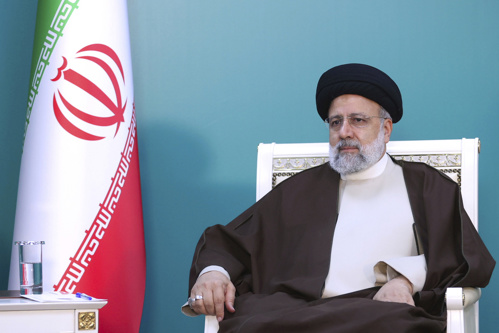 “So, they are quite vulnerable, but also understand that they're accelerating their nuclear program, so that perhaps if they did get a nuclear weapon, they could use that as leverage. Really, there’s a sense of urgency among the senators and I think also among Israeli leaders,” Mitchell said.
“So, they are quite vulnerable, but also understand that they're accelerating their nuclear program, so that perhaps if they did get a nuclear weapon, they could use that as leverage. Really, there’s a sense of urgency among the senators and I think also among Israeli leaders,” Mitchell said.
Whatever strategy comes about, U.S. and Israeli leaders appear to be on the same page regarding Iran.
“There’s resolve to make sure that Iran does not get a nuclear weapon,” Mitchell said.
Graham, in his meeting with Netanyahu, suggested that if Trump opens negotiations with Iran that the talks should be put on a clock.
“Don’t let him extend indefinitely the negotiations, and make sure what keeps him up at night is a nuclear Iran,” Mitchell said. “That’s the theme of the senators and much of Israel right now.”
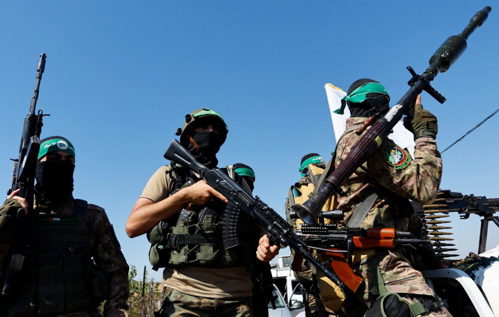 For now, Hamas remains on the clock as well, and the conflicting aims of Israel – which vows to destroy the terrorists – and Hamas – which says it will continue fighting – place the second phase of the ceasefire in serious doubt.
For now, Hamas remains on the clock as well, and the conflicting aims of Israel – which vows to destroy the terrorists – and Hamas – which says it will continue fighting – place the second phase of the ceasefire in serious doubt.
The second phase is supposed to include the release of remaining living male hostages, both civilians and soldiers, in exchange for hundreds more Palestinian prisoners.
Saudi Arabia will be a key player in the new Middle East, whatever that looks like.
Normalization of relations between Saudi Arabia and Israel was about to happen, and the timing of the Oct. 7, 2023 attack by Hamas was meant to ensure that normalization did not occur.
The Saudi factor
But Graham says normalization will happen sooner rather than later and that Saudi Arabia “will play the key, definitive role” in the reconstruction of Gaza, the Hamas home base mostly destroyed by Israel.
Getting Saudi Arabia on board may require “a defense pact with the U.S.,” Mitchell said. “The second thing they want is some sort of dignified resolution to the Palestinian problem. We’ll see if those two things happen, but (Graham) was very optimistic about normalization between Israel and Saudi Arabia, which he believes will transform the region.”
So too could the new relationship between Israel and the U.S.
“The new (Trump) administration is really giving a tailwind to Israel. I think we’re going to see probably a stronger position by both Israel and the U.S.,” Mitchell predicted.



